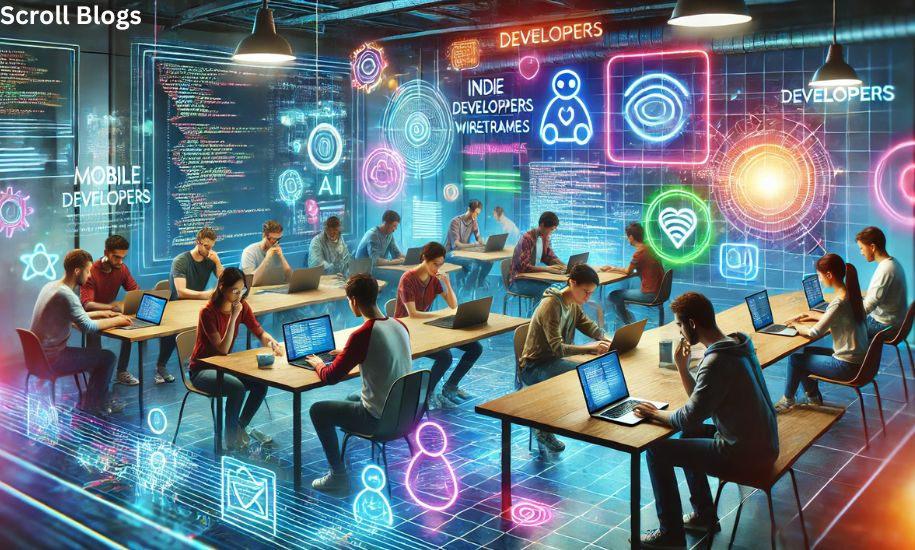In today’s fast-paced technological landscape, “tailoring GenAI products for diverse mobile developer personas” has become an essential consideration for companies aiming to meet unique developer needs. With the rise of AI-driven solutions, understanding the personas of mobile developers helps craft tools that maximize productivity, usability, and innovation. In this article by Scroll Blogs, we delve into the importance of tailoring GenAI products for diverse mobile developer personas and explore effective strategies for success.
Understanding Mobile Developer Personas
Mobile developers are not a monolithic group; they represent a diverse spectrum of skills, goals, and working environments. Each persona requires specific features and experiences tailored to their workflows. Common personas include:
- Indie Developers: Focused on creating unique apps with limited resources.
- Enterprise Developers: Working on large-scale, multi-layered projects.
- Game Developers: Specializing in high-performance, visually immersive applications.
- Startup Teams: Agile, fast-paced developers focusing on MVPs and scalability.
Recognizing these personas is the first step in tailoring GenAI products for diverse mobile developer personas.
he Role of GenAI in Enhancing Developer Experiences
Generative AI (GenAI) offers unparalleled opportunities to transform mobile development. By addressing common developer pain points, such as debugging, code generation, and design assistance, GenAI becomes a powerful ally. To ensure these tools resonate with diverse developer personas, their functionality must align with specific needs:
- Efficiency: Automating repetitive coding tasks to free up creative bandwidth.
- Customization: Allowing developers to adjust tools according to their project goals.
- Scalability: Supporting both small teams and enterprise-level projects.
With these aspects in mind, tailoring GenAI products for diverse mobile developer personas becomes a strategic advantage.
Key Features to Focus On
When tailoring GenAI products for diverse mobile developer personas, several key features must be prioritized:
Seamless Integration with Development Environments
Developers work within specific Integrated Development Environments (IDEs) such as Android Studio, Xcode, or Visual Studio. GenAI tools must integrate seamlessly with these platforms to ensure a frictionless user experience.
Language and Framework Support
Each persona relies on distinct languages (Swift, Kotlin, JavaScript) and frameworks (React Native, Flutter). Tailored GenAI products must accommodate a wide variety of tech stacks to remain relevant.
Real-Time Assistance and Debugging
Providing immediate feedback, code suggestions, and debugging solutions enhances developer efficiency, particularly for indie developers and startups.
Collaborative Features
For enterprise teams, tools that foster collaboration—such as shared AI-driven insights or version tracking—are invaluable.
Challenges in Tailoring GenAI Products
Despite the advantages, tailoring GenAI products for diverse mobile developer personas comes with its challenges:
- Balancing Simplicity and Complexity: Catering to beginners while supporting advanced users requires a delicate balance.
- Data Privacy Concerns: Developers may be wary of sharing proprietary code with AI platforms.
- Resource Limitations: Small teams might struggle to adopt advanced tools without proper training or financial backing.
Addressing these challenges is crucial to creating impactful solutions.
Best Practices for Tailoring GenAI Products
Conduct Persona-Centric Research
Understanding developers’ workflows, frustrations, and preferences through surveys, interviews, and usage analytics is essential.
Focus on Accessibility
Ensure that GenAI tools are easy to learn and use, with intuitive interfaces and comprehensive documentation.
Offer Customization Options
Provide settings and APIs that enable developers to tweak functionalities to suit their unique needs.
Prioritize Continuous Feedback Loops
Engage with developer communities, gather feedback, and iteratively improve the product.
Future Trends in GenAI for Mobile Development
The future of tailoring GenAI products for diverse mobile developer personas is promising, with trends such as:
- AI-Powered Prototyping Tools: Accelerating the app design process.
- Voice and Natural Language Coding: Allowing developers to interact with GenAI using plain English.
- Augmented Reality (AR) Assistance: Visualizing code impacts in real-time for game and AR developers.
As these advancements emerge, Scroll Blogs believes that keeping developer personas at the forefront of innovation will define successful GenAI products.
Conclusion
Tailoring GenAI products for diverse mobile developer personas requires a deep understanding of their unique challenges and aspirations. By prioritizing integration, customization, and accessibility, companies can create tools that resonate across the developer spectrum. This approach, as highlighted by Scroll Blogs, not only enhances productivity but also fosters innovation in the mobile development ecosystem.

